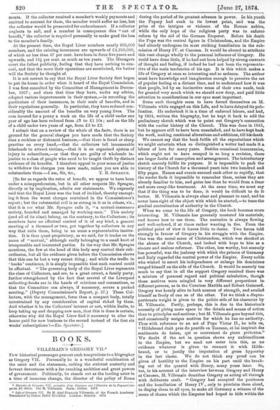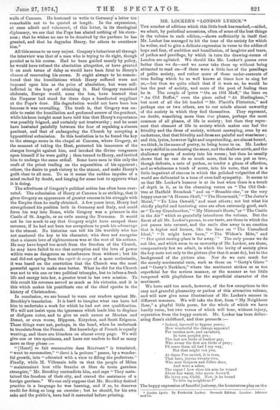BOOKS.
VILLEMAIN'S GREGORY VII.*
FEW historical personages present such temptations to a biographer as Gregory VII. Personally he is a wonderful combination of the saint and the statesman, uniting the strictest austerity and fervent devoutness with a far-reaching ambition and great powers of government. Politically, be stands out as the leading actor in a time of immense change, the director of the policy of Rome • Iffiloire de GrAjoire VII., precedie dun Diseours stir rifieloire de la PapautEJus- pease %I. Miele. Par M. Villemain. Paris: Didier. 1873.
• Lift of Gregory VII. By M. Abel Francois Villemain, of the French Academy Translated by James Bober Brockley. London: Bentley. 1874
during the period of its greatest advance in power. In his youth the Papacy had sunk to its lowest point, and was the prize of the intrigue or violence of the Roman nobles, while the only hope of the religious party was to enforce reform by the aid of the German Emperor. Before his death the Pope was the central figure in Christendom, and the Empire had already undergone its most striking humiliation in the sub- mission of Henry 1V. at Canossa. It would be absurd to attribute this vast change wholly to the personal influence of Gregory. He could have done little, if he had not been helped by strong currents of thought and feeling, if indeed he had not been the representa- tive of the main tendencies of his age. It is this which makes a life of Gregory at once so interesting and so arduous. The author must have knowledge and imagination enough to perceive the set of popular feeling at a distant time, and to understand how it was that people, led by an instinctive sense of their own needs, took for granted very much which we should now deny, and paid little attention to considerations in our eyes most important.
Some such thoughts seem to have forced themselves on M. Villemain while engaged on this Life, and to have delayed its pub- lication. He undertook it in a time of enforced leisure, and had, by 1834, written the biography, but he kept it back to add the preliminary sketch which was to point out Gregory's connection with the earlier history of the Church. This was done in 1845, but be appears still to have been unsatisfied, and to have kept back the work, making continual alterations and additions, till his death
We cannot Bay that the book fulfils all the expectations which we might entertain when so distinguished a writer had made it a
labour of love for many years. Besides occasional inaccuracies,.
which ought not to have escaped in so long a revision, there are larger faults of conception and arrangement. The introductory sketch scarcely fulfils its purpose. It is impossible to pack the history of the Church for a thousand years into two hundred and fifty pages. Names and events succeed each other so rapidly, that the reader finds it impossible to remember them, unless they are already familiar to him, and gains less than he would from a freer and more essay-like treatment. At the same time, we must say that if the thing was to be done, it would be difficult to do it better. M. Villemain is always clear and pleasant to read, and he never loses sight of the object with which he started,—to trace the gradual centralisation of authority in the Church.
When we come to the life of Gregory, the book becomes more interesting. M. Villemain has generally mastered his materials,.
and knows how to use them. The narrative is always flowing and well-ordered, if at times rather wanting in fire. From the political point of view it leaves little to desire. Two forces told strongly in favour of Gregory in his struggle with the Empire.
One was the moral sense of Christendom, which was shocked at the abuses of the Church, and looked with hope to him as a
sincere and zealous reformer. The other, less worthy, but scarcely less powerful, was the jealousy with which the princes of Germany and Italy regarded the central power of the Empire. Every noble who wished to assert his independence or enlarge his dominions ranged himself on the aide of the Church. It would be scarcely too much to say that in all the support Gregory received there was a mixture of personal regard and political calculation, though these motives were mingled in very different proportions in different persons, as in the Countess Matilda and Robert Guiscard.
Gregory was keenly alive to both sources of strength, and availed himself as freely of one as of the other. Yet we think a dispro- portionate weight is given to the politic side of his character by M. Villemain. Partly, perhaps, this is due to the historian's necessity of giving more space to the details and means of action than to principles and motives ; but M. Villemain goes beyond this, and occasionally assigns motives for which he has no authority..
Thus with reference to an act of Pope Victor II., he tells us, " Hildebrand etait pre.s du pontife en Toscane, et lui inspirait des sentiments de haine, qui se couvraient de piens pretextes."" We doubt if the act in question shows any unfriendliness to the Empire, but we need not enter into this, as no evidence whatever is given -to connect it with Hilde-
brand, or to justify the imputation of gross hypocrisy in the last clause. We do not think any proof can be
given of hostility to the Empire on his part until the break- ing out of the quarrel with Henry, many years later. So, too, in his account of the interview between Gregory and Henry at Canossa, N. 'Villemain describes Gregory as acting all through with deliberate craft. " Gregory had accepted the penitence and the humiliation of Henry 1V., only to proclaim them aloud,
to display them to all eyes, to make all Germany a witness of the scene of shame which the Emperor had hoped to hide within the walls of Canossa. He hastened to write to Germany-a letter too remarkable not to be quoted at length. In the expressions, at once adroit and vehement, of this letter, in its theological diplomacy, we see that the Pope has abated nothing of his stern- ness ; that he wishes no one to be deceived by the pardons he has granted, and that he degrades Henry, for others to overthrow him."
All this seems to us very unjust. Gregory's behaviour all through the interview was that of a man who is trying to do right, though puzzled as to his course. Had he been guided merely by policy, he would have refused the absolution altogether, or have granted it on such terms of delay as would have been fatal to Henry's chance of recovering his crown. It ought always to be remem- bered that the humiliations which Henry suffered were not imposed upon him as the price of absolution, but were self- inflicted in the hope of obtaining it. Had Gregory remained obdurate, Europe would, none the less, have learned that the Emperor had stood for three days a barefooted suppliant at the Pope's door. His degradation would not have been less because it was unavailing. The truth is, that Gregory was un- able to resist the humiliation and professed sorrow of the penitent, while his keen insight must have told him that Henry's repentance was possibly feigned, and certainly not trustworthy ; and he must have hesitated painfully between the fear of repulsing a sincere penitent, and that of endangering the Church by accepting a hypocritical submission. In this hesitation is to be found the key to the strange scene in the chapel at Canossa, where Gregory, at the moment of taking the Host, protested his innocence of the charges brought against him, and invoked the divine vengeance upon himself if he were guilty ; then turned to Henry, and invited him to undergo the same ordeal. Some have seen in this only the craft of the priest trading on the superstition of his opponent ; others, the desire to push victory to the utmost, and make Henry's guilt clear to all men. To us it seems.the sudden impulse of a mind racked by doubt, and longing for some test to approve what it is doing.
The adroitness of Gregory's political action has often been over- rated. The submission of Henry at Canossa is so striking, that it gives Gregory an appearance of greater success in his struggle with the Empire than be really obtained. A few years later, Henry had strengthened his position both in Germany and Italy, and could force his way into Rome, while Gregory was a prisoner in the Castle of St. Angelo, or an exile among the Normans. It would not be too much to say that Gregory might have escaped these reverses, if he had not been too scrupulous to push his advantage to the utmost. No historian can tell his life worthily who has not mastered the key to his character, who does not recognise that a sincere love of righteousness was at the root of his actions. He may have hoped too much from the freedom of the Church, he may have failed to see that corruption and the love of power within were as dangerous as interference from without ; but his zeal did not spring from the esprit de corps of a mere ecclesiastic, it was based on the conviction that the Church was the most powerful agent to make men better. What he did for the Church was not to win one or two political triumphs, but to infuse a fresh life and energy into her, a greater trust in her own mission. To this result his reverses served as much as his victories, and it is this which makes his pontificate one of the chief epochs in the history of Christendom.
In conclusion, we are bound to warn our readers against Mr. Brockley's translation. It is hard to imagine what can have led him to undertake a work for which he had not one qualification. We will not insist upon the ignorance which leads him to displace or disfigure notes, and to give us such names as Montan and Donat, or even worse, Hippona, Eutychus, and Scott Erigenus. These things were not, perhaps, in the bond, when he undertook to translate from the French. But knowledge of French is equally wanting, and there are blunders on almost every page. We will give one or two specimens, and leave our readers to find as many more as they please :-
"[Henri] se fait reconnoitre dans Beuevent " is translated, " went to reconnoitre," " eleve h la preture " passes, by a wonder- ful growth, into 44 educated with a view to filling the prefecture." Finally, while M. Villemain tells us that the people of Milan
maintenalent leur ville franche et libre de toute garrison etrangere," Mr. Brockley contradicts him, and says "They main- tained the freedom of their city, and craved the assistance of a foreign garrison." We can only suppose that Mr. Brockley desired practice in a language he was learning, and if so, be deserves credit for doing so long an exercise ; but he should, for his own sake and the public's, have had it corrected before printing.



































 Previous page
Previous page